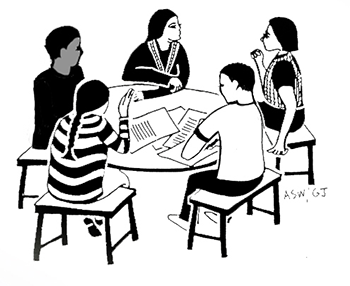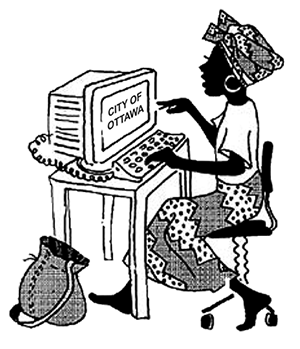
We all exercise influence every day – in our workplace, in our families, and with our friends! We may not use that word, but we use the same skills. With persuasion and persistence, we try to help others see our point of view.
Yet many of us have fears about influencing politicians – afraid we can’t express ourselves well enough, especially with someone we think knows more than us.
With a little experience you will find that politicians are just ordinary people. They are eager to hear from, and be educated by, constituents like you. Remember, there is no one more important to them than people like you (their constituents) who can vote for them in the next election. The Mayor is elected city wide and accountable to every Ottawa resident. You are their constituent.
Eight easy steps to organize a meeting with a member of City Council:
- Find your ward and Councillor
- Put your team together
- Prepare your message
- Contact the Mayor's or a Councillor's Office to book a meeting
- Book a meeting
- Meet with Mayor/your Councillor
- Send a thank you message
- Record your experience
Step One: Find Your Ward and Councillor
First, go to the ward map and type in your street number and name. Then, find your Councillor’s contact information.
Step Two: Put Your Team Together
Ask members of your community, partners, board members and/or community agency staff to go with you. The ideal number of people to attend is from two to five. This will show the politician that your community is concerned while not overwhelming them. Ensure that at least one member of your team is a constituent from the ward of the councillor you are meeting with. Councillors pay more care when a voter from their ward is present!
Step Three: Prepare Your Message
The content of the meeting should be planned in advance.
- Identify the key messages you wish to convey.
- What is the issue?
- Who does it affect?
- How does it affect your community?
- What is your specific ASK (what you want them to do)?
- What would it take to fix the issue?
- Research some key facts or figures that can support your argument.
- Keep in mind that you are likely to be asked questions about cost in relates to your ASK. What will it cost to fix the issue? You don’t need to have detail on the costs, but you will want to consider how to talk about the benefits of fixing your issue. One way is to stress how it will reduce costs for the City in the long run, as a particular social problem will be avoided (i.e. providing affordable recreation for youth, reduces police costs of responding to youth crime).
- Put your ideas in your own words, back up your ideas with your own experiences, examples and a few facts.
Step Four: Contact the Mayor’s or a Councillor’s Office to Book a Meeting
- Call or email to book a meeting.
- Be prepared to tell them the names, and affiliations of your team members and a couple of points you want to address. Put your request for a meeting in writing.
- Follow up with a reminder.

Step Five: Organize Your Meeting
The meeting with the Mayor or a Councillor should be organized and informative. Everyone should try to contribute to the meeting. Here are some tips:
- Select someone to be the main spokesperson. That person will introduce everyone and start the talking.
- Plan and rehearse what you plan to say during the meeting. Provide each team member with a role: lead speaker, person who speaks from their own experience, constituent, and note taker and/or observer. Agree who will speak when.
- Prepare materials to take to the meeting. Using facts or background information is important to help make your point. Make copies for each participant (including the Mayor and/or councillor and their assistant).
- On the day of the meeting, meet before the meeting to help each other to prepare.
Materials to take with you include:
- A profile of the group/groups your team represents.
- An agenda or list of topics to be covered.
- Any background information on the issue that you feel the politician should have (this is your opportunity to “educate” the Mayor and/or councillor about your issue!)
- Letters from other members in your community who support your efforts but are unable to attend.
Step Six: Meet with Mayor/Your Councillor
- Remember you’re the expert: Though feeling nervous is natural, you have every reason to feel confident. The Mayor and councillors rely on members of different communities to inform them about issues. You will likely know far more about the issues in your community than they do.
- Getting started: Introduce yourself and your team and thank the Mayor/Councillor for meeting with you. Make sure they know that you represent the voices of others in your community and that you will go back and talk to your community about the meeting. Politicians are affected by a direct show of community support.
- Deliver your message
- Explain your issue: Describe who is impacted by the issue, how it affects the Mayor and/or councillor, what you are asking of the Mayor and/or councillor, and what is needed to address the issue. After you have made your points, answer questions from the Mayor and/or councillor and make sure to ask him/her how they would be prepared to help.
- Your ASK: Ask the Mayor and/or councillor what he or she is willing to do. Write down what they have said they will do.
- If you don’t have the answer to a question, tell them you will get back to them with the information right away and expect them to do the same thing! Write down any steps you promise to take.
- Closing: Be sure to thank the Mayor and/or councillor for their time. Read out what each of you promised to do after the meeting (i.e. send answers to any unanswered questions, send more information, talk to neighbours, family, friends and colleagues, etc.).

Step Seven: Send a Thank you Message
In your message, remind the councillor and/or Mayor of what they agreed to do. State when you will get in touch again. It is a great idea to keep in touch with the politicians. One idea is to send him or her an invitation to visit your agency or community. Start building a valuable relationship with your elected representative!
Step Eight: Record Your Experience
Once you have met with the Mayor/Councillor fill out the Report Form (see Appendix D). This is a good way for you to document the meeting, keep the Mayor and/or councillor accountable, and tell others from your group or agency about the meeting results.
